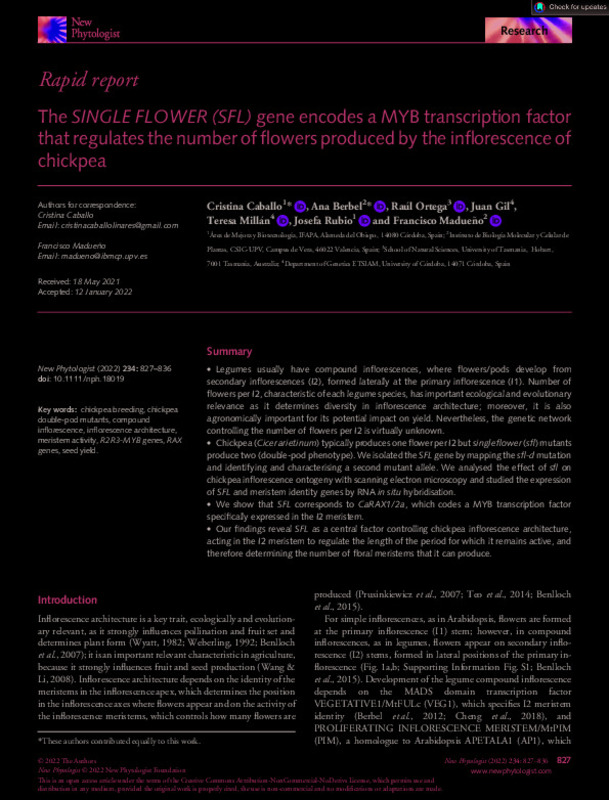Caballo, C.; Berbel Tornero, A.; Ortega, R.; Gil, J.; Millán, T.; Rubio, J.; Madueño Albi, F. (2022). The SINGLE FLOWER (SFL) gene encodes a MYB transcription factor that regulates the number of flowers produced by the inflorescence of chickpea. New Phytologist. 234(3):827-836. https://doi.org/10.1111/nph.18019
Por favor, use este identificador para citar o enlazar este ítem: http://hdl.handle.net/10251/196985
|
Título:
|
The SINGLE FLOWER (SFL) gene encodes a MYB transcription factor that regulates the number of flowers produced by the inflorescence of chickpea
|
|
Autor:
|
Caballo, Cristina
 Berbel Tornero, Ana
Ortega, Raúl
Gil, Juan
Millán, Teresa
Rubio, Josefa
Berbel Tornero, Ana
Ortega, Raúl
Gil, Juan
Millán, Teresa
Rubio, Josefa
 MADUEÑO ALBI, FRANCISCO
MADUEÑO ALBI, FRANCISCO
|
|
Entidad UPV:
|
Universitat Politècnica de València. Instituto Universitario Mixto de Biología Molecular y Celular de Plantas - Institut Universitari Mixt de Biologia Molecular i Cel·lular de Plantes
|
|
Fecha difusión:
|
|
|
Resumen:
|
[EN] Legumes usually have compound inflorescences, where flowers/pods develop from secondary inflorescences (I2), formed laterally at the primary inflorescence (I1). Number of flowers per I2, characteristic of each legume ...[+]
[EN] Legumes usually have compound inflorescences, where flowers/pods develop from secondary inflorescences (I2), formed laterally at the primary inflorescence (I1). Number of flowers per I2, characteristic of each legume species, has important ecological and evolutionary relevance as it determines diversity in inflorescence architecture; moreover, it is also agronomically important for its potential impact on yield. Nevertheless, the genetic network controlling the number of flowers per I2 is virtually unknown. Chickpea (Cicer arietinum) typically produces one flower per I2 but single flower (sfl) mutants produce two (double-pod phenotype). We isolated the SFL gene by mapping the sfl-d mutation and identifying and characterising a second mutant allele. We analysed the effect of sfl on chickpea inflorescence ontogeny with scanning electron microscopy and studied the expression of SFL and meristem identity genes by RNA in situ hybridisation. We show that SFL corresponds to CaRAX1/2a, which codes a MYB transcription factor specifically expressed in the I2 meristem. Our findings reveal SFL as a central factor controlling chickpea inflorescence architecture, acting in the I2 meristem to regulate the length of the period for which it remains active, and therefore determining the number of floral meristems that it can produce.
[-]
|
|
Palabras clave:
|
Chickpea breeding
,
Chickpea double-pod mutants
,
Inflorescence architecture
,
Meristem activity
,
R2R3-MYB genes, RAX
,
Genes
,
Seed yield
,
Compound inflorescence
|
|
Derechos de uso:
|
Reconocimiento - No comercial - Sin obra derivada (by-nc-nd)
|
|
Fuente:
|
New Phytologist. (issn:
0028-646X
)
|
|
DOI:
|
10.1111/nph.18019
|
|
Editorial:
|
Blackwell Publishing
|
|
Versión del editor:
|
https://doi.org/10.1111/nph.18019
|
|
Código del Proyecto:
|
info:eu-repo/grantAgreement/AEI/Plan Estatal de Investigación Científica y Técnica y de Innovación 2017-2020/PGC2018-099232-B-I00/ES/DESCIFRANDO EL MODO DE ACCION DE TERMINAL FLOWER 1/
info:eu-repo/grantAgreement/GVA//PROMETEO%2F2019%2F004/
info:eu-repo/grantAgreement/MINECO//BIO2015-64307-R/ES/CONTROL GENETICO DE LA ARQUITECTURA DE LA INFLORESCENCIA DE LEGUMINOSAS: NUEVOS GENES PARA LA MEJORA DE SU RENDIMIENTO/
info:eu-repo/grantAgreement/MINECO//RTA2017-00041/
|
|
Agradecimientos:
|
We thank Ludovico Dreni for advice on phylogenetic analysis and M. J. Domenech for efficient technical assistance. We also thank C. Ferrandiz, M. A. Blazquez and J. L. Weller for helpful discussions and critical reading. ...[+]
We thank Ludovico Dreni for advice on phylogenetic analysis and M. J. Domenech for efficient technical assistance. We also thank C. Ferrandiz, M. A. Blazquez and J. L. Weller for helpful discussions and critical reading. Work at the FM laboratory was financed through grants from the Spanish Ministerio de Ciencia Innovacion y Universidades, FEDER and Generalitat Valenciana (BIO2015-64307-R, PGC2018-099232-B-I00 and Prometeo/2019/004). Work at IFAPA and UCO has been supported by INIA project RTA2017-00041-00-00, co-financed by the European Union through the ERDF2014-2020 'Programa Operativo de Crecimiento Inteligente'. CC acknowledges her PhD fellowship INIA-CCAA.
[-]
|
|
Tipo:
|
Artículo
|









